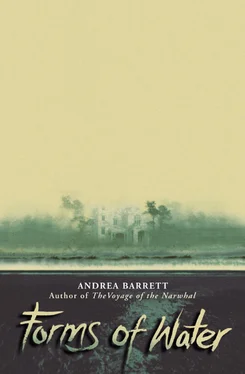She was glad, and yet she could not sleep. She picked up the phone, thinking that she might, despite the lateness of the hour, check in with Wendy and make sure she and Win were all right, but when she dialed her number, a voice she couldn’t place right away answered, “White residence.”
“Hello?” The voice clicked in her brain. “Christine? Is that you?”
“Wiloma,” Christine said.
Wiloma held the phone away from her and stared at it. Christine — what was she doing there? “I thought you were coming tomorrow. I’m sorry, I meant to call you earlier. There’s been a little problem with my uncle.”
“I heard. Wendy told me all about his disappearance. But I know you’ll find him — you know how important it is that I start work with him immediately.”
“I know,” Wiloma said. “We haven’t found any trace of him yet, but I think I know where he’s headed — with some luck I’ll find him tomorrow morning. I’ll have him home with you by dinnertime.”
“Your husband’s with you?”
“Ex-husband.”
“Whatever. Don’t let him distract you — remember that he does not have the best interests of this Healing at heart.”
With her words, Wiloma suddenly saw the evening’s events in a different light. Christine was right, she thought — Waldo had not come on this trip to help Brendan, nor had he held her out of desire or love. He wanted something, several somethings, and none of them were worthy. She would have to guard herself against confusion. He was sleeping already, in the room next to her; she thought she could hear his gentle snores. He was sleeping, and dreaming of Sarah and Courteney, and plotting the houses he hoped to convince her to let him build on Brendan’s land, and she’d been a fool to let his warm hands and the bewildering fragrance of his neck seduce her. She was here to find her uncle; nothing more.
“I’m all set up here,” Christine said. “We’re ready to go. But you have to bring your uncle to me soon. We don’t have much time.”
“Tomorrow,” Wiloma said, and she thought of her children. They couldn’t have been pleased to have Christine arrive unannounced. She hoped they had been polite. “May I talk to Wendy?” She wanted to hear her daughter’s voice, wanted to tell her what had happened — not about the restaurant, not in detail; not about Waldo’s warm hands or the dancing or the moment at the door, but just something, any thing: “We had a pleasant evening,” she might say. “Your father and I.”
Christine said nothing. “Hello?” Wiloma said. “Are you there?”
“I’m here.”
“Would you put Wendy on?”
“It’s terribly late,” Christine said after a brief hesitation. “The children are fine, but it’s so late — maybe it would be better to wait until tomorrow to talk to them.”
Wiloma looked at her watch. It was late, it was quarter past one; it wouldn’t be fair to wake Wendy just for the comfort of hearing her voice. And Wendy and Win were safe, she knew, in Christine’s care — she hadn’t felt entirely comfortable leaving them alone, and Christine’s presence in the house reassured her. “It’s all right. I’ll talk to them tomorrow.”
“That would be best.”
“They’re all right? They must have been surprised to see you.”
“They’re fine. They were a little startled, but you prepared them well. They’re nice children.”
“They are,” Wiloma said.
“How about you? Are you all right? You sound a little displaced. Disoriented.”
“I’m fine,” Wiloma said. She felt a sudden yearning to confide in Christine, but she pushed it aside; Christine had enough to do, she had to focus on Brendan. “I’ll see you tomorrow.”
“Tomorrow,” Christine said.
Wiloma hung up and slept for a while, but her dreams were haunted by visions of Brendan, shrunken and writhing in pain, trying to die and unable to free his Spirit from his body. She woke drenched in a clammy sweat. I have to find him, she thought. I can’t let him die like Da. Then she lay in the darkness, unable to keep herself from reliving her grandfather’s last days.
She’d been alone in the house with him, in Coreopsis: 1961, six weeks after her nineteenth birthday. Gran had died that March of a heart attack, and Brendan had left for St. Benedict’s; Henry had married Kitty and fled with her to Irondequoit. Her neighbors had been busy baling hay and her friends were working or off to college or newly married or pregnant or both; and she’d been trapped alone with Da in a house that smelled of death.
The house had smelled of other things as well. It smelled of a refrigerator seldom cleaned, of food left out on countertops, of the damp spot below the sink where water dripped from a leaky pipe. It smelled of the mice that had drowned in the basement — that July had been wet, there’d been puddles down there — and of cat: Mimi had been fifteen, and sometimes she went on the furniture. It smelled of Da, who had lain in his bed all summer, wasted and incontinent, while the cancer that had first appeared as a lump in his armpit ate him away.
She had dreaded Da’s death and feared that he would never die. Weeks went by when she spoke only to him, and to the doctor who came once a day to give him morphine. Henry had been so caught up with his new wife, his new life, that he hardly ever called, and when he did she could feel him straining not to hear her need for help. He was very busy, he said. He was starting his first development and finishing his first house. He was in love, he said; he could not leave Kitty even for a day; did she need any money? He sent handsome checks she didn’t need, and when she said she was frightened, he offered to hire a nurse.
But Da slept most of the time, and he didn’t want a stranger in the house. When he woke his dreams spilled over into his conversations, and he spoke of the flock of birds he saw on the walls, of a lake where he’d once fished, of dirt, water, moss, rocks, clouds. He fell inward, behind his eyes, and he talked to Gran and to Wiloma’s dead father, and to Brendan, who was gone. There were bees, he said, in the ice that formed on their pond, and sometimes he moved his swollen hands on the sheets and said, “A reservoir?” in a voice still fresh with disbelief.
He floated through his past like a leaf on the river, and while he dipped and swam Wiloma sat beside him and read. She sat next to the bed on which she’d arranged his limbs — he’d been big, but now he was nothing but bones and knobs so dense it took two hands to lift them. She read to fend off the urge to flee and to keep at bay the scenes she saw: her own life, about to open up to her. The city where she might live, the children she might someday have — she saw the house locked, empty, gone, and the life she’d lived there finally done.
On the night before Da died, when he said, “I want to go. I’m ready,” and then closed his eyes and waited, she saw the stone walls of their house tumbled and covered with grass. Da said, “Help me,” and she thought of placing a pillow over his face, releasing them both. She picked up the pillow and held it and then knew she couldn’t; he was in pain but he was still alive. She rubbed the brittle bones of his hands instead. Then she reached for the book on his table, which had lain there all along but which she’d never touched before. Words, she remembered thinking. Distraction. The book had been written by a British scientist and published in 1872, twenty years before Da was born: The Forms of Water in Clouds & Rivers, Ice & Glaciers, faded gilt words on a faded red spine.
That night, while Da lay struggling to shed his body, she read the first few pages and learned again that water might be a gas or a liquid or a solid; clouds or steam or rain or breath, rivers or ice or snow. She had that book still, in a cedar chest in the attic. The title and long passages were still burned into her brain. You may notice in a ballroom, she read — oh, she remembered this, she remembered the words exactly— that as long as the door and windows are kept closed and the room remains hot, the air remains clear; but when the door or windows are opened a dimness is visible, caused by the precipitation to fog of the aqueous vapor of the lungs. If the weather be intensely cold the entrance of fresh air may even cause snow to fall.
Читать дальше












